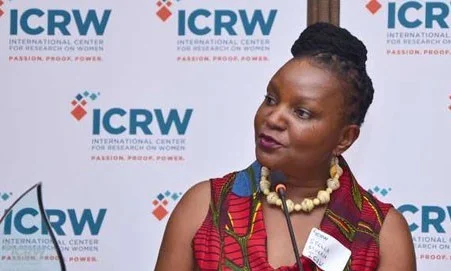Baroness Goudie Blog: September Newsletter
Gender equality at the UN General Assembly | The effect of conflict on women | The human cost of fashion | Mourning the loss of Stella Mukasa
I write to you after returning from a few days in Brussels with The Georgetown Institute of Peace and Security. It was a very special trip where Rose Gottemoeller, the highest ranking civilian woman in NATO’s history and a champion for gender equality, received the International Trailblazer Award from the Georgetown Institute for Women, Peace and Security. The award is given annually to leaders who recognise the important role of women in creating a more peaceful and secure world.
Under Rose Gottemoeller's leadership, NATO redoubled its efforts to integrate women’s perspectives and participation in the work of the security organisation. NATO has also deployed Gender Advisors, established a panel of civil society and women’s organisations to inform the alliance and developed an action plan to advance the women, peace and security agenda.
Rose Gottemoeller is a true trailblazer and an incredible role model for women all over the world.
Over the passed weeks I have also been thinking about the gatherings taking place at the UN General Assembly 2018, both the official and the 'fringe'.
Governments, the private sector, philanthropists and foundations continue to commit funding to the 8 Sustainable Development Goals to eradicate extreme poverty and hunger. But, there is still so much to do and all these pledges need to translate into real action to ensure that the development goals can be genuinely achieved. We are making great efforts, but we must together push further!
As always I share a number of articles that I believe are important stories to support and share, to ensure we continue to drive towards a more equitable world. Particularly this month, we celebrate the life of an incredible woman, Stella Mukasa, ICRW's Regional Director for Africa, who sort to eradicate gender-based violence.
Best wishes,
Baroness Goudie
Everything you need to know about gender equality at the United Nations General Assembly
A guide to the global gender equality agenda at the 73rd United Nations General Assembly (UNGA 73), who will be there and what’s at stake
The largest yearly meeting of world leaders! What better time than this to highlight the importance, challenges and progress on women’s rights and gender equality.
Even before the General Assembly began, UN General Assembly President-elect María Fernanda Espinosa Garcés called attention to gender-based violence and political empowerment in a speech about the session.
Garcés, just the fourth woman President of the UNGA in its 73 years history, is presiding over this year’s Assembly, which opened on 18 September 2018, at the UN Headquarters in New York. The High-level General Debate, when Prime Ministers and Presidents convene in New York City, will begin on Tuesday, 25 September 2018 and run until 1 October.
Read more from UN Women
Conflict disproportionately affects women across the world, while their resilience holds communities together
On International Day of Peace, Brita Fernandez Schmidt, Executive Editor, Women for Women Internationalwrote for The i newspaper on how conflict always disproportionately affects women.
On International Day of Peace, we need to consider ways we can help women rebuild their lives
Major General Patrick Cammaert, former UN Peacekeeping Commander, once said: “It has probably become more dangerous to be a woman than a soldier in an armed conflict.” This may sound unbelievable, but I have seen first-hand how conflict disproportionally affects women. This summer, my work with Women for Women International took me over 3,000 miles from Kosovo to the Democratic Republic of Congo (DRC), two countries that have been deeply scarred by conflict. In many ways, they could not be more different, but they provide clear examples of how women bear the brunt of war and conflict. These are ways in which I have seen conflict disproportionally affects women. Women and children make up the majority of casualties in modern war The wars in Kosovo and DRC have something devastating in common: civilians bear the brunt of suffering. We often hear the statistic that in modern warfare, 9 out of 10 casualties are non-combatants – a reversal of the ratio a century ago. The communities I visited in South Kivu, in eastern DRC, and Drenica, in central Kosovo, had both witnessed massacres of innocent civilians and mass displacement. Kosovo’s war uprooted 90 per cent of the population. In DRC, there were 2.2 million new displacements in 2017 alone.
Read more at The i newspaper
Fashion to Die For
Kalpona Akter is worried for her life. Her support for the Bangladeshi garment workers who produce more than $30 billion worth of fashion for Western retailers every year puts her at odds with powerful factory owners and the country’s ‘industrial police.’
Read more at Business of Fashion
ICRW mourns the loss of Stella Mukasa
A human rights lawyer by training, a women’s rights activist by nature, Stella sought to improve the human condition and focused her energies on eradicating the causes and devastating impacts of gender-based violence. She is revered in Uganda for her tireless efforts to create and enforce gender-responsive laws and policies and played a key role in drafting Uganda’s Domestic Violence Act and in mobilizing community support for a gender-responsive constitution.
“Stella was passionate about the advancement of human rights and empowerment of women, girls, marginalized groups. She was firm and yet gracious.” ~ Deborah Nakisuyi, Africa Regional Office colleague
Stella joined ICRW in 2012 and took up leadership of our program of research on violence, rights and inclusion. In 2015, she was appointed Regional Director for Africa, opening ICRW’s regional office in 2016 in her native Uganda. Under her care and guidance, ICRW expanded its influence and impact, launching new work on violence against children, strengthening capabilities of grassroots organizations addressing gender-based violence and advising government, multilateral and non-profit stakeholders working to end violence.
“Stella’s legacy will be felt by women across Africa, from the woman parliamentarian in Rwanda to the Ugandan widow able to provide for her family on land inherited from her husband,” said ICRW CEO Sarah Degnan Kambou. “She was fiercely determined, deeply insightful and passionate about her work, and at the same time, she was a warm and generous colleague and friend.”
Stella is survived by her husband, Apollo Nelson Makubuya, and their three daughters, Athena, Angela and Andrea. Together, Apollo and Stella have each made their mark on the lives of many in Uganda. Currently a partner at MMAKS Advocates, a corporate law firm in Kampala, Apollo has also consulted extensively in human rights and development law and is currently serving as Deputy Prime Minister of the Kingdom of Buganda.
ICRW is grateful for the life and work of our colleague, Stella Mukasa. Our thoughts are with her family and friends.





